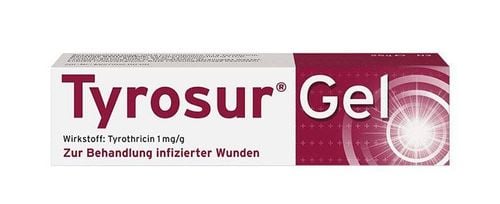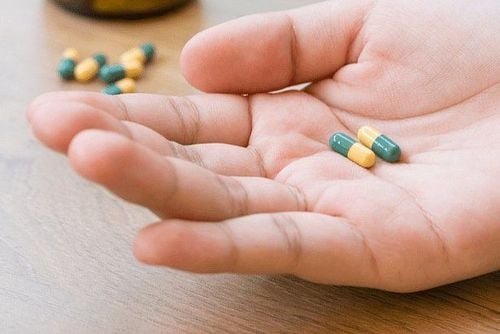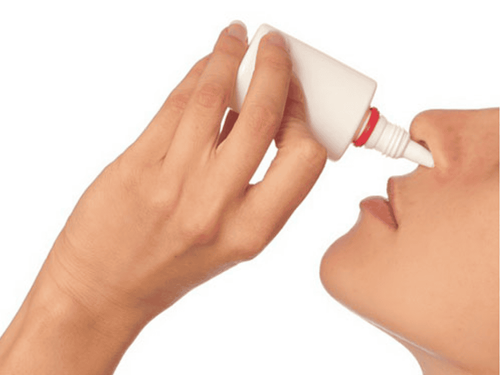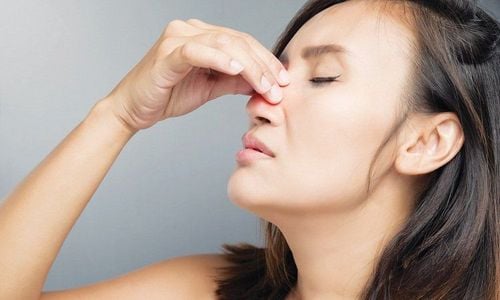This is an automatically translated article.
Lodegald-des is an antihistamine, used in the treatment of allergic rhinitis and chronic idiopathic urticaria. The following article provides some information about the uses, dosage and some notes when using Lodegald-des medicine.
1. What is Lodegald-des drug?
Lodegald-des drug belongs to the group of 2nd generation antihistamines, whose main active ingredient is Desloratadin. Lodegald-des drug is prepared in the form of film-coated tablets with a strength of 5mg.
Desloratadine is the main active metabolite of Loratadin - the second generation tricyclic antihistamine, has less CNS depressant effects than the first generation. Desloratadine has selective peripheral H1 receptor antagonist effects, Relieves symptoms of allergies. Desloratadine can be used alone or in combination with an anti-congestive agent such as Pseudoephedrine sulfate.
2. Indications and contraindications of the drug Lodegald-des
Indications
Allergic rhinitis. Idiopathic chronic urticaria. Contraindications
Allergy or hypersensitivity to Desloratadin, Loratadin or any ingredient of Lodegald-des.
3. How to take Lodegald-des
The drug Lodegald-des is taken orally, taking it once a day. The time to take Lodegald-des does not depend on the meal.
Lodegald-des medicine is for use only by adults and children 11 years of age and older. Average dose: 5 mg/time x 1 time/day.
Children under 11 years old: Lodegald-des film-coated tablets are not suitable for use in this population.
Patients with hepatic or renal impairment: the recommended dose is 5 mg/day, taken every other day.
Overdosage and management
No clinically significant changes have been reported with Desloratadine up to 45 mg/day (9 times the therapeutic dose). In case of overdose, stop using Lodegald-des and go to a medical facility for timely treatment.
Treatment of overdose Desloratadine consists mainly of symptomatic and supportive treatment. Reduce absorption of Desloratadine, clear the stomach by introducing a placebo such as activated charcoal. Hemodialysis does not significantly remove Desloratadine. In addition, Desloratadine is not eliminated by peritoneal dialysis.
4. Undesirable effects when using the drug Lodegald – des
Some symptoms may be encountered when using Lodegald-des such as:
Headache (very common). Fatigue, dizziness, drowsiness. Dysmenorrhea . Dry mouth, nausea, indigestion. Muscle pain. Pharyngitis When symptoms become severe, it is necessary to stop using the drug and go to a medical facility for treatment.
5. Notes when using Lodegald-des
Overdosage and toxicity (including death) have been reported in children under 2 years of age receiving over-the-counter antihistamines, cough suppressants, expectorants, and nasal decongestants alone or in combination. to relieve symptoms of the upper respiratory tract. There is currently no clear evidence on the effectiveness of the drug in young children, and its use is contraindicated in children under 2 years of age.
Driving, operating machines: although Lodegald-des rarely causes drowsiness or affects the central nervous system compared to first-generation antihistamines, it should be used with caution in drivers. machinery operation.
Drinking alcohol: should be avoided while taking the drug.
Patients with a history of epilepsy: There have been reports of seizures occurring in patients taking antihistamines. Use Lodegald-des with caution in this subject.
Patients with renal impairment: Desloratadine is eliminated by the kidneys as an active metabolite, the dose should be reduced in patients with renal impairment. In addition, the dose should be reduced in patients with hepatic impairment. Lodegald-des contains lactose and should not be used in patients with rare hereditary problems such as lactose intolerance or glucose-galactose malabsorption.
Pregnancy: Animal studies have shown that Desloratadine is not teratogenic, however caution should be exercised when administering the drug to pregnant women.
Lactating women: Desloratadine is excreted in breast milk. Lodegald-des is not recommended for use in nursing women.
6. Drug interactions
Desloratadine increases the concentration and effect of alcohol, CNS depressants, anticholinergics, selective serotonin reuptake inhibitors.Hydroxyzin, Droperidol, Pramlintide: increase the concentration and effect of Desloratadine. Desloratadine reduces the concentration and effect of Acetylcholinesterase inhibitors, Betahistine, Benzylpeniciloyl polylysin, Amphetamine, P-glycoprotein inducers.
Desloratadine may have pharmacokinetic interactions with drugs that affect liver microsomal metabolism enzymes such as Azithromycin, Erythromycin, Cimetidine, Ketoconazole, Fluoxetin. However, no significant changes in ECG and clinical symptoms, vital functions, or adverse events were observed.
Above are important notes about the drug Lodegald-des, knowing the information and understanding more about how to use it will help the drug use process to be highly effective.
Please dial HOTLINE for more information or register for an appointment HERE. Download MyVinmec app to make appointments faster and to manage your bookings easily.













